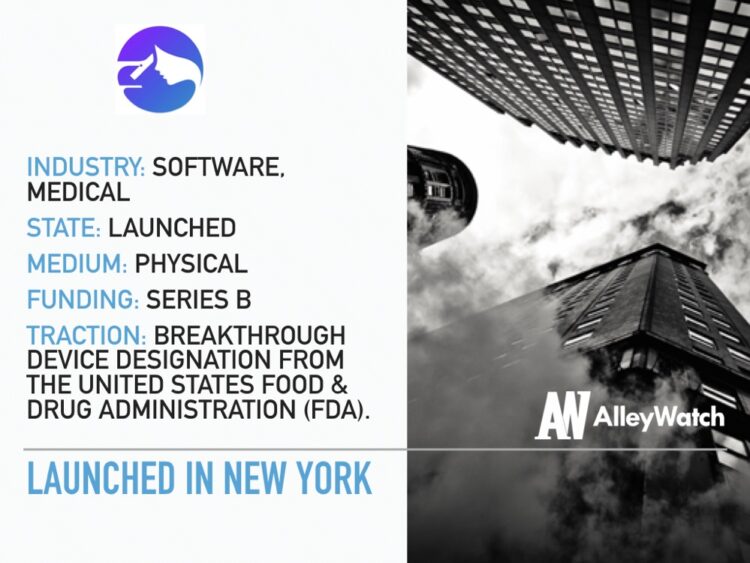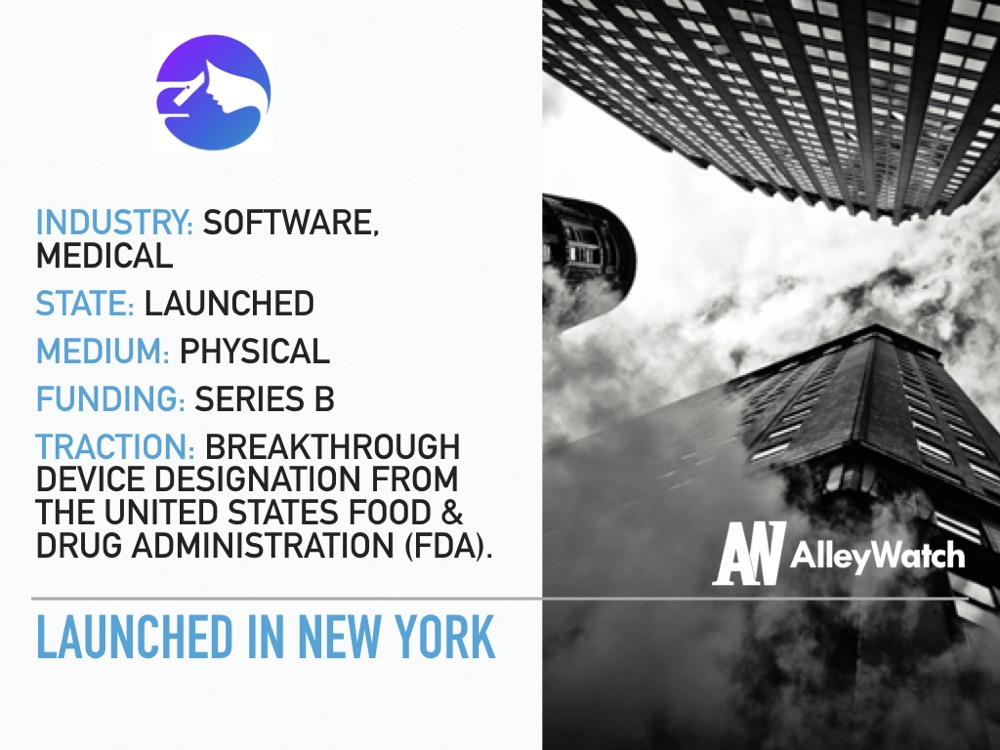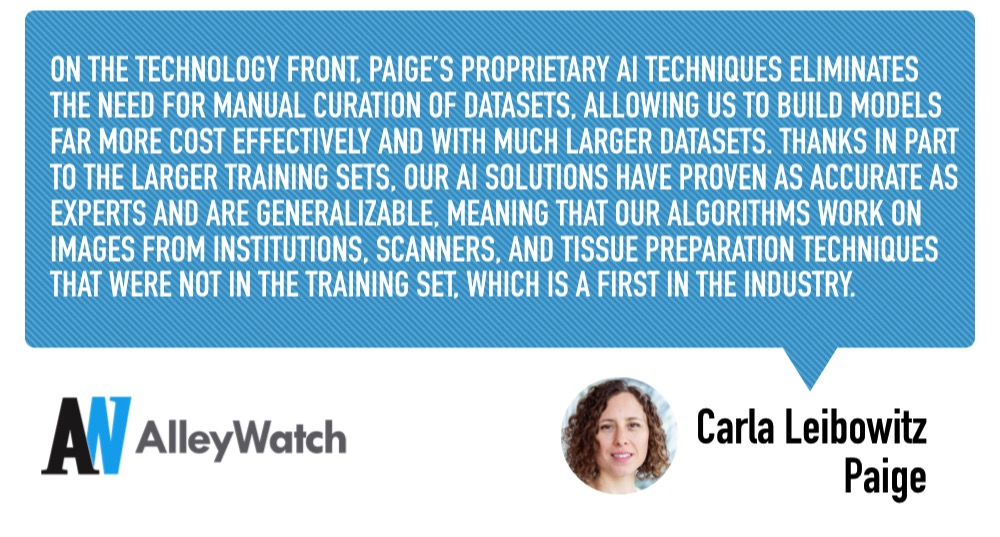The technology to diagnose cancer tissue has remained relatively the same for decades, but the power of AI is changing that. Paige is at the forefront of this disruption. Paige’s system uses AI to assist pathologists in accurately detecting new patterns in the cancer tissue, thus providing new insights about the cancer and allowing pathologists to determine the best treatment options. Paige is also the first and only AI-powered company to have received a breakthrough device designation from the United States Food & Drug Administration (FDA). While most of the startups we cover proclaim “they are changing the world” while solving a problem that affects a narrow subset of the population, Paige has the real potential to do so, if successful.
AlleyWatch sat down with Chief Business Development Officer Carla Leibowitz to learn more about the science behind Paige and the company’s future expansion plans.
Tell us about the product or service that Paige offers.
Paige licenses diagnostic, clinical-grade software, which transforms the diagnosis and treatment of cancer in hospitals and clinical laboratories while providing custom services to the biopharma industry. Paige’s system offers a practical blueprint for adopting artificial intelligence-based technology in a way that integrates easily with hospital workflow systems and ensures safety, accuracy, and data privacy.
Paige’s system is vendor-neutral, with AI that works across scanner vendors and staining techniques. The system and secure, agile products are the first and only AI technology to receive a United States Federal Drug Administration (FDA) breakthrough designation in Pathology and Oncology. Paige has proven there’s a better way to move pathology into the digital future and moves pathology teams there quickly.
 What inspired the start of Paige?
What inspired the start of Paige?
The technology pathologists use to diagnose cancer in tissue has not changed significantly in the past 100 years. At the same time, while the demands for pathology services is increasing, the number of qualified pathologists around the world is actually dropping.
With a background at Memorial Sloan Kettering, we recognized the potential to transform how pathologists assess tissue, thus increasing speed, accuracy, and consistency to what has traditionally been a mostly manual, qualitative practice. The delivery and creation of advanced computational diagnostics that can help find and characterize diseases quickly and accurately can benefit both physicians and patients. Ultimately, this has the power to improve outcomes and reduce healthcare costs.
Pathologists and oncologists need to accurately detect the presence of cancer, determine the aggressiveness of the cancer, and figure out which therapy the cancer will respond to the best, so we looked to AI for its power to find new patterns in the tissue, which results in additional knowledge about the cancer. By uncovering what information can be drawn from tissue that couldn’t be found before, Paige is fueling cutting-edge cancer research and translating these new discoveries into solutions that help physicians and patients arrive at the right diagnosis faster and more cost-effectively.
Nominations closing soon for AlleyWatch’s 2020 NYC Tech Influencers feature. Know someone amazing who belongs on this list? Nominate them today here. FINAL DEADLINE 2/28. Looking to drive targeted response from the NYC Tech community at scale, learn more about partnering with AlleyWatch on this initiative here.
How is Paige different?
Paige offers advantages on the regulatory, technology, and data fronts.
Paige is the first and only AI company to have received a breakthrough device designation from the United States Food & Drug Administration (FDA). The FDA has given its approval to expedite the development of Paige’s technology based on its potential to provide for more effective diagnosis and treatment for life-threatening or irreversibly debilitating diseases.
Paige also is the first and only company to receive a CE mark in Europe for a computational diagnostic device (Paige Prostate) for which we have a distribution partnership with Philips.
On the technology front, Paige’s proprietary AI techniques eliminate the need for manual curation of datasets, allowing us to build models far more cost-effectively and with much larger datasets. Thanks in part to the larger training sets, our AI solutions have proven as accurate as experts and are generalizable, meaning that our algorithms work on images from institutions, scanners, and tissue preparation techniques that were not in the training set, which is a first in the industry.
As I mentioned earlier, Paige has exclusive rights to MSK’s library of 25 million digitized (de-identified) pathology slides and associated reports, with access to genomic, therapeutic, and outcomes information corresponding to those slides. This is not only a vast dataset but a dataset that includes the diagnostic decisions from teams of the best pathologists in the world.
What market does Paige target and how big is it?
Paige is targeting a couple of nascent markets: digital diagnostics for clinical pathology as well as AI-derived biomarkers both for research and clinical use. Some estimates have this market growing to ~$1B by 2025.
What’s your business model?
Paige licenses diagnostic software to hospitals and clinical laboratories. The company also provides custom services to the biopharma industry.
On the clinical side, Paige offers state-of-the-art diagnostic software via software-as-a-service (SaaS) subscriptions with packages based on per-case bundle, per user or enterprise level. The offering includes a world-class AI-native software and digital ecosystem, which includes a CE-marked viewer and sharing tools to deliver AI and streamline communications between pathologists, and a scalable, secure platform, which provides storage and archiving of whole-side image (WSI) data.
On the services side, Paige works with BioPharma organizations to build digital diagnostic solutions as well as tools that can be used in the many phases of drug development and clinical trials in which pathology plays a pivotal role.
These AI solutions—for clinical and research use—are delivered via a scalable computing platform that enables faster, easier migration from traditional a microscope to digital pathology workflows. Rather than investing in the hardware and expensive tools, Paige’s AI-native platform enables pathology teams to move into the digital future with a software-based solution.
Who are your primary competitors?
While there are other companies in the space, none have published or demonstrated comparable capabilities to Paige. No other company is approaching the market comprehensively: working with pathologists to develop clinical-grade tools across multiple cancers and working with biopharma to create biomarkers that can then be deployed via a clinical platform.
What are the milestones you plan to achieve in the next six months?
Paige will add new solutions to the platform over the next three years, which will include cancer grading, subtyping, and tissue characterization in the areas of breast, prostate, bladder and skin cancers.
Paige will add new solutions to the platform over the next three years, which will include cancer grading, subtyping, and tissue characterization in the areas of breast, prostate, bladder and skin cancers.
What advice can you offer companies in New York?
Focus on meeting those key milestones that will get you to your next valuation. Understand your customers intimately what they need, what alternatives they have to your product, and how your product fits into their work to make sure you’re using your resources in the most impactful areas
Where do you see the company going now over the near term?
The successful completion of the Series B funding provides Paige with new capital to drive FDA clearance of our products and expand our portfolio, delving deeper into cancer pathology, novel biomarkers, and prognostic capabilities. Additionally, the company will accelerate commercial efforts in the U.S. and expansion in Europe, Brazil, and Canada.
What’s your favorite restaurant in the city?
This is an impossible question, so I’ll go with a hidden gem: Sushi by Bou. It’s great food, fantastic ambiance/decor and a very creative bartender make for a fantastic experience.
Nominations closing soon for AlleyWatch’s 2020 NYC Tech Influencers feature. Know someone amazing who belongs on this list? Nominate them today here. Final Deadline 2/28. Looking to drive targeted response from the NYC Tech community at scale, learn more about partnering with AlleyWatch on this initiative here.





